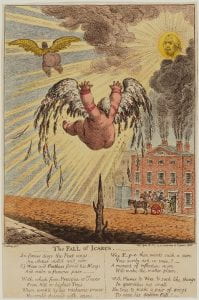How does satire work effectively with a tale like Icarus’s, defined by its serious subject matter? In the case of this particular myth, satire has both accentuated certain possible interpretations and subverted these potential meanings. For example, in his 1807 print The Fall of Icarus, English satirist and printmaker James Gillray exaggerated the notions of fault and foolishness from the original myth. Gillray’s Icarus is the obese Lord Temple, an entitled bureaucrat who was unpopular with King George III and his own peers in Parliament. Temple lost his administrative position when the King fired his uncle, the Prime Minister. In this cutting political satire, Gillray equates Temple’s dismissal with Icarus’s fall. Icarus’s hubris, or pride, is a commonly held explanation for his fall, which Gillray easily translates to this scene of King George III as the sun melting Temple’s wings. The artist exacerbates the blame on Icarus, or Lord Temple, for his misfortune in a short poetic inscription: “With Plumes & Wax, & such like things/ In quantities not small/ He tries to make a pair of Wings/ To ease his sudden Fall!” This is a reference to Temples alleged theft of office supplies like quills, but since Daedalus crafted the wings in the original myth, Icarus’s responsibility and incompetence are exaggerated with the charge that he created them.
James Gillray, English, 1756–1815
The Fall of Icarus
1807
Hand-colored etching on paper
Sheet: 13 ½ × 9 in. (34.3 × 22.9 cm)
Gift of Jane and Raphael Bernstein; 2010.84.71
Anne Sexton’s poem, “To a Friend Whose Work Has Come to Triumph” also exaggerates the pride and audacity Icarus embodies. (See “In Verse: Why Do Poets Care about the Icarus myth?” for more on Sexton’s work). Sexton imparts a defiant reading of the original myth to her audience, arguing, “Who cares that he fell back to the sea?” (l.12) in praise of Icarus’s boldness, mocking the tale’s cautionary reflection on pride. The comedy-folk performers Garfunkel and Oates exhibit a similarly defiant tone and admiration of pride in their song “Such a Loser.” However, Garfunkel and Oates emphasize these themes in a criticism of the Icarus myth, unlike Sexton. “Such a Loser” comforts the inept subject of the song, encouraging the listener to “Throw your heart at it, so what if you break it?” The singers elaborate upon this theme with the lines “Icarus is bullshit, that’s why it’s called mythology/ People can’t stand genius without an apology/ F**k that, f**k them.” Even in their satirical mode, Garfunkel and Oates reject the same criticism of Icarus that Sexton does—the notion of hubris as a fatal flaw—instead choosing to employ the Icarus myth to celebrate confidence.

You must be logged in to post a comment.